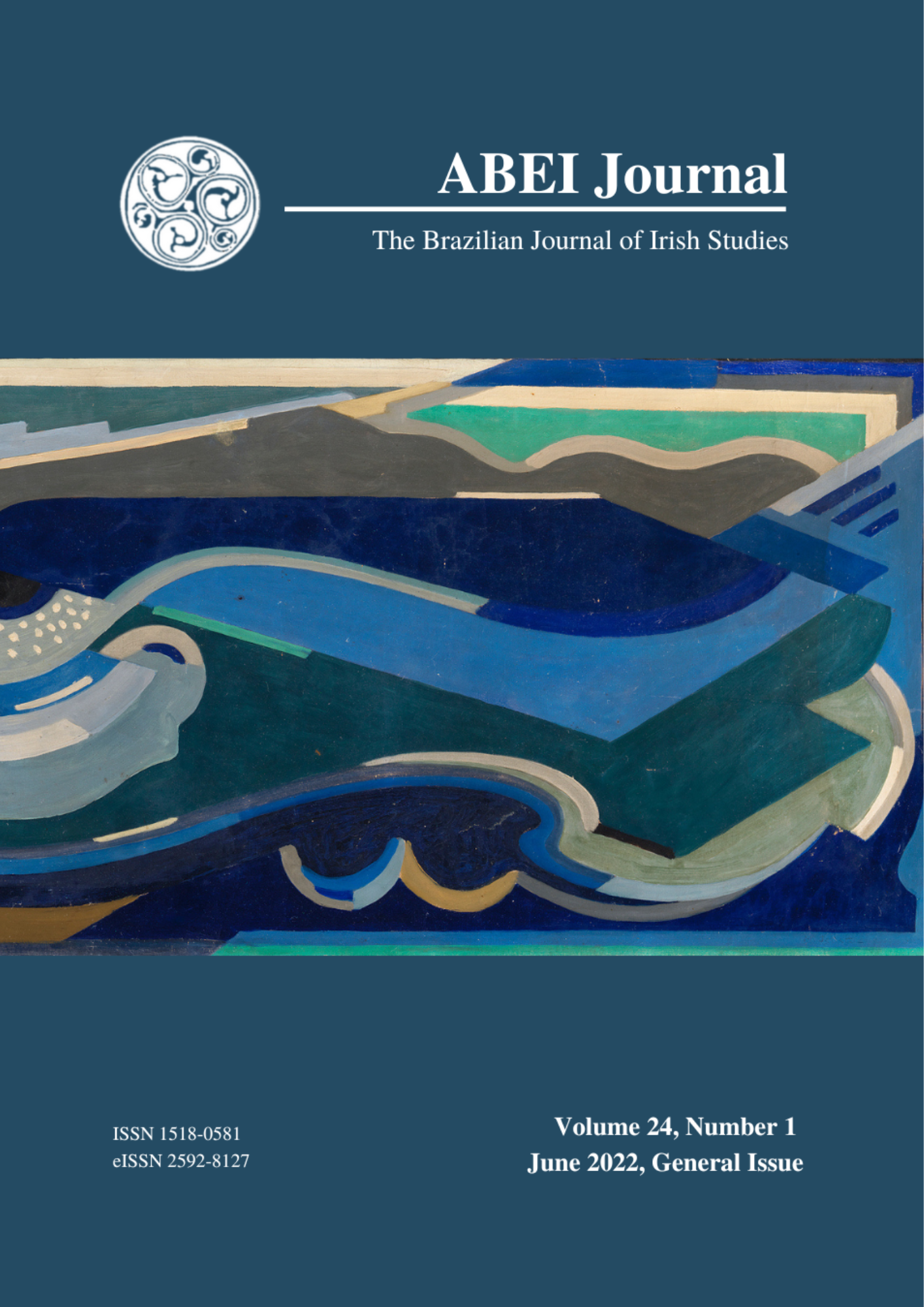An Outcome of Many Wars: Irish Democracy in the Follow-Up to the Period of Independence and Further Possibilities
DOI:
https://doi.org/10.37389/abei.v24i1.205358Abstract
An explanation for the success of Irish democracy is the presence of competing views about Ireland, where “wars” did not correspond to a “neat” victorious side. It can be linked to the Easter Rising of 1916, the Anglo-Irish Treaty dispute, and the ensuing Civil War. “High politics” also presents similar divisions and a sort of acceptance of the limits of a single narrative. The Irish political system, to a large extent a remnant of what existed before independence, plays a significant role in the process. It is worth highlighting PR-STV, canvassing, and political representatives’ clinics. As a whole, I emphasise the relevance of value orientated readings of democracy. The concept of “little voices” is useful to sum up the overall context, translating what is present in the explicit scenario into the more “daily” operation of Irish politics. It reflects the interplay between “people”, their “little voices”, shifting, and their relation to the broader political scenarios. Several dimensions of violence remained, explicit in the treatment of travellers, women and children, asylum seekers, homeless. The expansion of room for little voices may constitute a foregoing contribution of Ireland to the creation of (un)worlds, and therefore to world democracy.
References
Banville, John. Snow. London: Faber & Faber, 2020.
Banville, John. April in Spain. London: Faber & Faber, 2021.
Bew, Paul, Hazelkorn, Hellen, and Patterson, Henry. The Dynamics of Irish Politics. London: Lawrence and Wishart, 1989.
Black, Benjamin. Holy Orders. Oxford: Picador, 2013.
Boyce, D. George. Nationalism in Ireland. London and New York: Routledge, 1991.
Dennehy, Tim. Between the Mountains and the Sea: Tim Dennehy sings the songs of Sigerson Clifford. Skellig Records, 2003. Lyrics available at: www.sceilig.com/the_ballad_of_the_tinkers_daughter.htm.
Doherty, James, and Hickey, D. A Chronology of Irish History Since 1500. Dublin: Gill and MacMillan, 1989.
Eagleton, Terry. 1999, The Truth About the O’Irish. Dublin: New Island Books.
Fanning, Ronan. Éamon de Valera: A Will to Power. London: Faber & Faber, 2015.
Ferriter, Diarmaid. Between Two Hells: The Irish Civil War. London: Profile Books, 2021.
Fishamble. “Fishamble: The New Play Company Presents The Treaty by Colin Murphy”. 2022. Available at: www.fishamble.com/treaty.html.
Foley, Donal. Man Bites Dog [several volumes]. Dublin: The Irish Times, 1970-1980s.
Garvin, Tom a. Nationalist revolutionaries in Ireland, 1858-1928. Oxford: Clarendon Press, 1987.
Garvin, Tom b. 1922 - The Birth of Irish Democracy. Dublin: Gill & MacMillan, 1996.
Garvin, Tom c. Preventing The Future: Why Was Ireland So Poor For So Long? Dublin: Gill & Macmillan, 2004.
Huntington, Samuel. A Terceira Onda: a democratização no final do século XX. São Paulo: Ática, 1994.
Kee, Robert. The Green Flag, Volume Three: Ourselves Alone. Harmondsworth: Penguin, 1989.
Kissane, Bill. “The Not-So Amazing Case of Irish Democracy.” Irish Political Studies, 10 (1995): 43-68.
Lijphart, Arend. Democracies: Patterns of Majoritarian and Consensus Government in Twenty-One Countries. New Haven, and London: Yale University Press, 1984.
Lipset, Seymour. Political Man: The Social Basis of Politics. Baltimore: The John Hopkins University Press, 1981.
Lysaght, Paddy. How to Become a Sucessful TD. Dublin: The O’Brien Press, 1987.
MacKenna, John. We Seldom Talk About the Past: Selected Short Stories. Dublin: New Island Books, 2021.
McGahern, John. [1963] The Barracks. London: Faber and Faber, 1983.
McGahern, John. [1965] The Dark. London: Faber and Faber, 1983.
McGahern, John. [1978] Getting Through. London: Faber and Faber, 1988.
McGahern, John. Amongst Women. London: Faber and Faber, 1990.
McGahern, John. The Collected Stories. London: Faber and Faber, 1993.
McGahern, John. Creatures of the Earth: New and Selected Stories. London: Faber and Faber, 1997.
McGreevy, Ronan. “Staging the Treaty: This marathon production will recreate debates a century later.” The Irish Times. 11 Sep. 2021. Available at: https://www.irishtimes.com/culture/stage/staging-the-treaty-this-marathon-production-will-recreate-debates-a-century-later-1.4666067.
Moore, Brian. [1962] An Answer from Limbo. London: Flamingo (Harper Collins), 1994.
Moore, Brian. [1983] Cold Heaven. London: Flamingo (Harper Collins), 1995.
Moore, Brian. [1990] Lies of Silence. London: Vintage Paperbacks, 1992.
Munger, Frank. The Legitimacy of Opposition: The Change of Government in Ireland in 1932. London: Sage Publications, 1975.
Nic Dháibhéid, Caoimhe. “4 January 1922: The Treaty Debates - The Politics of Emotions.” RTÉ - Boston College, 2022. Available at: https://www.rte.ie/centuryireland/index.php/articles/4-january-1922-the-treaty-debates.
O’Connor, Frank. [1931] Guests of the Nation. Dublin: Poolbeg Press, 1979.
O’Connor, Frank. [1937] The Big Fellow. Dublin: Poobelg Press, 1991.
O’Connor, Frank. [1961] An Only Child. Belfast: The Blackstaff Press, 1993.
O’Connor, Frank. [1968] My Father’s Son. Belfast: The Blackstaff Press, 1994.
Ó’Corráin, Donnchadh (comp.). Electronic version. Debate on the Treaty between Great Britain and Ireland, signed in London on the 6th December 1921: Sessions 14 December 1921 to 10 January 1922. 2000. Author: The Deputies of Dáil Eireann. Available at: https://celt. ucc.ie/published/E900003‑001.html.
O’Faolain, Sean. Vive Moi! - An Autobiography. London: Rupert Hart-Davis, 1965.
Oireachatas. “Dáil Éireann Debate on Treaty.” Available at: https://www.oireachtas.ie/en/debates/debate/dail/1921-12
O’Mahony, Nessa. The Branchman. Dublin: Arlen House, 2018.
Portela, Irene. A Pretexto da Irlanda – (Des)mundos, guerras, sujeitos, vozinhas, democracias. (Doctoral Dissertation). PPGCP/ICHF/UFF, 2017.
Raidió Teilifís Éireann. “Massive crowds line the streets of Dublin for 1916 parade.” 28 Mar. 2016. Available at: https://www.rte.ie/news/ireland/2016/0327/777698-easter-rising/.
Robinson, Mary. “Preface.” Irish Travellers: Culture & Ethnicity. Eds. M. McCann, S. Siocháin, and J. Ruane. Belfast: Institute of Irish Studies (for The Anthropological Association of Ireland), 1996.
Todorov, Tzvetan. Insoumis - Essai. Paris: Robert Laffont / Versilio, 2015.
Wikipedia a. “1918 Irish General Election.” Available at: https://en.wikipedia.org/wiki/1918_Irish_general_election
Wikipedia b. “1922 Irish General Election.” Available at: https://en.wikipedia.org/wiki/1922_Irish_general_election.
Wikipedia c. “Irish Civil War.” Available at: https://en.wikipedia.org/wiki/Irish_Civil_War.
Wolin, Sheldon S. Politics and Vision - Continuity and Innovation in Western Political Thought. Expanded edition. Princeton and Oxford: Princeton University Press, 2004.
Yarbrough, Grant. Achieving Genuine Moments from Ordinary Origins: Sheldon Wolin, Hannah Arendt, and Jacques Rancière on Democracy. (Thesis). Georgia State University, 2012. Available at: https://scholarworks.gsu.edu/political_science_theses/42.
Downloads
Published
Issue
Section
License
Copyright (c) 2022 Irene Portela

This work is licensed under a Creative Commons Attribution-NonCommercial 4.0 International License.


